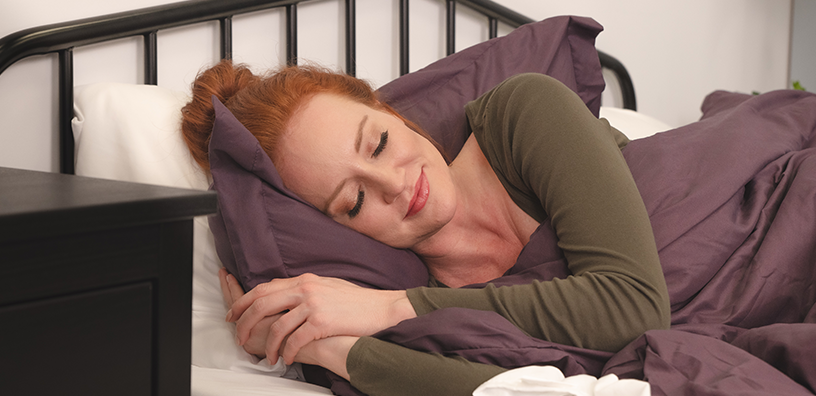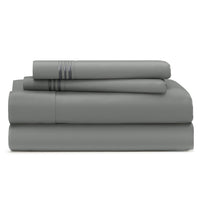
7 Facts You Didn’t Know About Bedding
How much do you know about bedding? Bedding might seem like a pretty boring subject. What more would you need to know besides how to make a bed or fluff a pillow? As with everything, the past informs the present and we’d like to make the argument that the facts we’ve gathered could change your bedding game for the better.
Thread count doesn't mean as much as you think it does

One of the biggest questions we get at Cosy House is ‘What is the thread count of your sheets?” To tell you the truth, we don’t have one! Unlike other brands, we recognize that thread count actually means very little in terms of quality. “Thread count” refers to the number of threads in one square inch of fabric. Unfortunately, manufacturers have figured out how to cheat the system to make their sheets appear more “luxurious.” By binding two or even four threads together to be “multi-ply”, they can technically say their sheets have a two or four times higher thread count than they do. Yet they aren’t any softer or stronger than they would be with singular strands. That’s why at Cosy House, we’ve skipped all the thread count mumbo-jumbo and focused on creating quality sheets at an affordable price.
Changing your bedding is important

Changing your bedding frequently is an absolute must. As you sleep, bacteria, dead skin and hair, oil, and more are transferred between your body and the bed. This happens every time you crawl into bed. Imagine the toll that laying on a week’s worth of bacteria and dead skin can take on your health. Neglecting to wash your bedding has profound effects on your skin, resulting in acne and other conditions. It can trigger allergies, like coughing, sneezing, and itchy eyes and skin. What’s the easiest way to prevent this? Change your bedding frequently. [1,2,3]
Dryer balls dry heavy material faster

It’s no secret that drying heavy bedding can be an arduous task. In fact, it can be so frustrating to dry a massive comforter that you may find yourself skipping it entirely. Don’t skip the washing, just get some dryer balls. Natural wool dryer balls cut drying time in half by breaking up damp fabrics and allowing heat to pass more easily. Since your drying time goes down, you save money and get your clean bedding sooner.
Bamboo has natural temperature control

What does bamboo have to do with bedding? Everything! Bamboo is the future of bedding for many reasons. People most often switch because 100% pure viscose derived from bamboo is naturally temperature regulating. For hot sleepers, this is essential, as bamboo is more breathable than cotton. No more waking up sweaty and hot under your blankets. Don’t worry cold sleepers, you can use bamboo viscose too! The breathability of bamboo sheets means you can layer up without growing too warm. The bamboo adjusts to you!
The sheets you pick impact your sleep

Whether you’re a hot sleeper, a cold sleeper, or somewhere in between, sheets have a huge impact on the way you sleep. Their breathability, softness, and size all contribute. When deciding what bedding to buy, it’s important that you consider several major factors when picking out sheets. What kind of sleeper are you? Do you tend to bundle up under blankets or sleep with barely a sheet? How big is your bed? You may want to size up if you like to have more to cuddle. The more comfortable you can make yourself, the easier time you will have falling asleep.
Pillows collect dust and dead skin

That sounds pretty nasty, doesn’t it? Unfortunately, it’s true. Your skin is living, constantly regenerating new cells throughout the day, especially during sleep. What happens to those old skin cells? They fall off...and land on your pillow. This doesn’t just happen with dead skin. The oils produced by your skin and any bacteria living on your face transfer as well. This can potentially lead to acne and allergy issues. Look for multi-layered pillows that feature a naturally breathable and moisture-wicking outer layer to avoid irritation and keep your sleep sanctuary clean and fresh. [1,2,3]
Cotton may be popular, but it's not the best

Take a look at your current bedding. We’re willing to bet it’s partly, if not mostly cotton. While cotton is the most widely used material for sheets, that doesn’t mean it’s the best. We’ve been told by countless customers that their cotton sheets were the biggest contributor to their discomfort in bed, whether that be growing too hot, itchy, or piling. Cotton is a great material if you’re willing to pay a hefty price. Think $130 for one set of sheets. Most of us can’t afford that kind of luxury and opt for much cheaper sets without thinking critically about the quality and going with whatever everyone else is using. Do some investigation. The herd isn’t always right.
Which facts were new to you? Are there any facts we missed? Let us know!
We've gone ahead and enclosed a 10% off coupon below for you to use if you'd like to take the plunge and try out our sheets for yourself! To shop our collection & get 10% OFF use the code 'BLOG10' at checkout.
- Woodcock AA, Steel N, Moore CB, Howard SJ, Custovic A, Denning DW. Fungal contamination of bedding. Allergy. 2006 Jan;61(1):140-2. doi: 10.1111/j.1398-9995.2005.00941.x. PMID: 16364170. https://pubmed.ncbi.nlm.nih.gov/16364170/
- Okareh OT. Bacterial pathogens from bed linen used in secondary and tertiary health facilities in Benin city, Nigeria. J Microbiol Exp. 2018;6(2):84-87. DOI: 10.15406/jmen.2018.06.00192
- Regina Boyle Wheeler. Health Hazards When You Don’t Wash Your Sheets. August, 2023. https://www.webmd.com/a-to-z-guides/ss/slideshow-dirty-sheets-skin-problems

